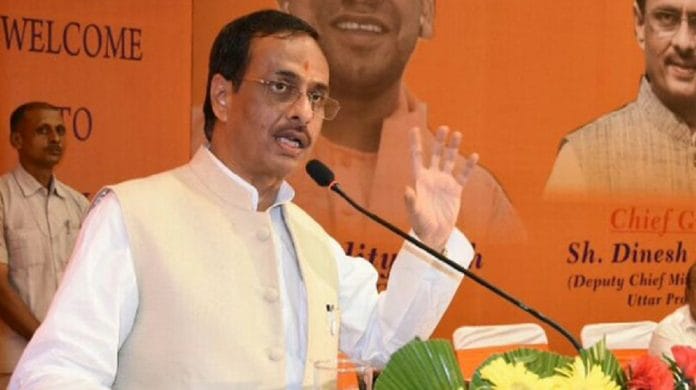Lucknow/New Delhi: Dinesh Sharma, the Deputy Chief Minister and Education Minister of Uttar Pradesh, is surprised at the controversy that has erupted over the state government’s new Private University Ordinance, which includes an ‘anti-national’ clause.
“I have no idea why such a controversy is happening on a single clause in the ordinance, when our only aim behind the proposal is to cut down any unnecessary activity on the campus and strengthen academics,” Sharma told ThePrint when asked about the controversy that has erupted over the anti-national clause.
The Yogi Adityanath-led UP cabinet approved the Uttar Pradesh Private University Ordinance 2019 Tuesday, in an effort to gain control over private universities in the state. A clause in the ordinance says that students at universities should not indulge in any “anti-national activities”, which has attracted controversy.
“Universities can conduct any kind of academic activities, but students cannot say ‘Bharat tere tukde honge’,” Sharma said, referring to the sedition controversy at Jawaharlal Nehru University in 2016.
The controversial clause
Apart from improvement in the quality of education and faculty standards, the ordinance wants universities to work towards national integration, social harmony, international cooperation and promoting patriotism. It also wants universities to give an undertaking that no anti-national activity will take place on the campus.
The ordinance states: “No anti-national activity can happen inside the university campus and nobody will be allowed to participate in any such activity using the university’s name. If someone is found indulging in such activities, action will be taken on them as per the rules of the ordinance.”
‘Unnecessary addition to progressive ordinance’
A senior University Grants Commission (UGC) official, who did not wish to be identified, said the anti-national clause was an “unnecessary addition” to what was otherwise a progressive ordinance.
“I have gone through the ordinance proposal and it is a progressive one. It talks about improvement of quality of education, finishing exams on time and filling up faculty vacancies,” the official said.
“This is the kind of rule that UGC should have brought in, but the state government is doing it. Apart from the anti-national clause, which is an unnecessary addition, there is nothing wrong with it.”
The official added that an education ordinance is not supposed to deal with such issues; that’s the job of the police and state authorities.
Also read: Modi govt’s new education policy draft wants law taught in English & local languages
UGC wanted states to regulate pvt universities
The UGC has an overarching authority over all universities which are affiliated to it, including private universities, but it does not directly control them. If a state government wants to frame separate rules or bring in an ordinance to govern the universities, it can do so.
The UGC has been insisting that states bring in a regulatory mechanism for private universities.
Aimed at creating a single regulation mechanism for all private universities operating out of UP, the proposed ordinance is likely to be cleared in the next assembly session, which begins 18 July.
State of private universities in UP
There are 27 private universities in UP, including prominent ones like Amity University, which has two campuses in Noida and Lucknow, Sharda University, Galgotia University and Shiv Nadar University, among others. Most of these universities do not have student unions or elections, and most of the activities that happen on the campus are approved by the top management.
Officials at a number of universities, including Amity, refused to comment on the issue when contacted by ThePrint.
A source from Amity, however, said: “There are two kinds of activities that happen on the campus. One is events directed by the UGC, like anti-terrorism day, where there is no conflict. Other than that, whatever event happens on campus is approved by the top management, so there is no question of anything going wrong.”
Meanwhile, a source in the central government said the move could be directed towards targeting Mohamad Ali Jauhar University, a private university in Rampur that is closely associated with senior Samajwadi Party leader Azam Khan.
Suggestions taken from stakeholders
According to minister Sharma, the ordinance was promulgated after a number of court cases filed by students against private universities over delays in getting degrees.
“We took around 1.5 years to make this ordinance. We held general meetings with private universities thrice, and five times with their representatives,” he said.
He added that suggestions were taken from various stakeholders, including several vice-chancellors. The ordinance also proposes a system of checks for granting honorary degrees.
“The aim is to encourage investment in UP, but at the same time, not turn education into a business. There will be healthy competition among universities to impart better education. We can now open new universities,” the deputy CM said.
“We have already received proposals for setting up varsities focused on skill development, Vedanta, a Ramayana University for Ayodhya, one university for women, apart from many medical and engineering universities.”
There are a total of 334 private universities across India, as per the UGC’s list. The highest number — 51 — is in Rajasthan.
Also read: Modi govt’s new education policy draft wants separate body for research & innovation






